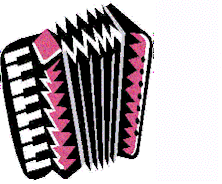Accordion FAQ

How do accordions work?
Accordions are kind of like two giant harmonicas joined together with a bag of air in between them. As you push and pull the bellows, air flows through the reeds that are activated by the keys/buttons you press, and out comes sound! Like any wind instrument, the amount of air being used determines things like volume.
How do you know which button to press?
You may notice that on the left side of the accordion is typically a big collection of buttons, which seems a lot less intuitive than the side with a piano on it. On standard "stradella" bass accordions, these buttons are actually mostly chords, and they're grouped together in ways that are convenient for most common songs (for you music theory nerds, they're actually arranged in the Circle of Fifths!). The system is pretty easy to learn!
One obvious fact you might not realize until you try picking up an accordion yourself for the first time is that you can't actually see the left side of the accordion at all! You're completely blind and have to rely on touch and muscle memory, which is why some buttons have marks in them similar to how a computer keyboard has notches on the home row keys. Even if you can look down at the left side on a sufficiently small accordion... it's the side that moves away from you, so there's really no way to ever get a good look at it!
What are those buttons that are next to the keyboard or bass buttons?
On a lot of bigger accordions, you'll find register switches. These accordions are actually equipped with multiple sets of reeds and clicking these switches activates various combinations of reeds. It's kind of like the analog version of switching instruments on a digital keyboard. Different registers can produce wildly different sounds: light high pitched tones, full and bassy tones, or relaxing musettes. Of course, the registers and reeds available depend on the accordion!
What's the difference between piano and chromatic button accordions?
Piano accordions and chromatic button accordions all play the same notes. That is, you can map the chromatic buttons to the same keys on a piano. Chromatic button accordions arrange their buttons more two dimensionally, meaning they can fit more buttons in less space than a piano can. However, chromatic button layouts actually duplicate buttons, meaning multiple buttons will activate the same exact note.
Ultimately, piano accordions are easier to pick up and play if you even remotely know how to play piano. However, chromatic button accordions have various benefits as well: the smaller button profile usually requires less jumping around and the systems are designed in a way to make things like changing keys and playing chords much easier to do.
What's a diatonic button accordion?
Diatonic button accordions, unlike chromatic button accordions, tend to be smaller and have way less buttons. To get more notes out of them, each button actually maps to two notes, depending on whether you are pushing or pulling on the bellows! They're pretty popular because of their much smaller size. Plus the different bellows action gives a different feel to the music you're playing in the first place.
I found an old accordion! How much is it worth?
I often see posts on accordion forums looking for an appraisal on an old accordion. Unfortunately... Accordions are a very undocumented instrument most of the time. Unless you have a very specifically notable make/model, it's honsestly really hard to track down much information on individual accordion models. Even those with a recognizable name on them might still be difficult to actually track down. Ultimately what makes old accordions more or less expensive is usually their features: How many buttons/keys are there? How many registers are there? Are there any other fancy features (tone chamber, free bass, those cool register switches you hit with your chin, etc.)? You can usually value an accordion by comparing it to accordion with similar features.
I have a question that's not listed here
Feel free to reach out if you have any questions! ...Or just do a web search. That'll probably be faster and better than my answer lol. I will try to update this page with any other questions I can think of, and any good questions that are sent my way.